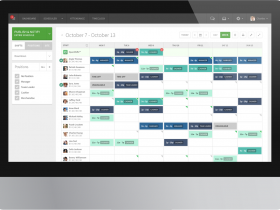Sustaining a retail business digitally has ceased to be a simple job. Easy monopoly has become a thing of the past, as innovative thinkers are coming up with new models. They are more powerful than ever and retail competitors are cropping up by the minute. That said, social media has consumers accessing specific information whenever they want about whatever they need. New competitors never posed a bigger challenge. You need to go all overboard to stop your market share from being snatched by rookies! But those are not the only challenges. New regulations, compliance rules, increased awareness of social and environmental issues require retailers to be extra careful of their activities.
A more holistic approach in business technology is likely to enable companies to handle things better. Retailers also need to be aware when to change their technologies. A successful retail business needs to have future-forward management. To be successful, first and foremost, you need to innovate and offer new ways to take care of stakeholders.
Retailers need to operate across a multitude of channels as efficiently as possible. They need to break down organizational barriers and seamlessly connect all the functions spread worldwide. Challenging times lie ahead, but the good news is with innovative technologies, rich analytical tools, well-equipped employees, and integrated processes, retailers will have the scope for sustainable competitive advantage.
SAP offers retailers the insights to convert challenges into opportunities, and that is the only sure path to profitability and growth. By understanding what works for your business and predicting future trends, you can get down to the specifics of customer trends, seasonal patterns, inventory requirements, and thus drive your operations across the network. Adaptability in changing environments plays a crucial role in that respect.
SAP solutions give you the power to leverage information in a way that puts you ahead in the knowledge sphere. Industry leaders are known to embrace flexible infrastructures, which can deliver effective visibility into future market trends, and what customers will need, not just what they need now.
Ensuring success
Your choice of technology should enable you to optimize your business by reinventing your supply chain. It should serve as your tool to access a vast amount of shopper data and enable you to manage your sourcing and buying processes across numerous channels. Retailers can select appropriate sourcing locations to fulfill orders most efficiently and cost effectively. You should also be capable of improving inventory performance through various methods such as flexible fulfillment and “available to promise”, which is an SAP inclusion.
Retailers that are able to master the flow of data are likely to gain competitive advantage. SAP for retail provides you with intelligence on a number of important aspects. You can gain access to customer insights, analyze buying patterns, and predict future demand with full visibility into real-time customer data.
Preventing failure
“Out of stock” situations need to be avoided at all costs, as they can severely impact reputation. With SAP solutions involving RFID, you can use accurate information to sort your inventory. Warehouse management and optimal transportation can also be ensured. Your goods can reach customers well in time and help you correctly plan inventory accounting, replenishment, and allocation.
Overall impact
Having one technology instead of many implies that you can view all your business processes from a single point. This way, you can easily assess the risks, areas of excellence, and even the gaps that need to be worked on. You should be able to maintain the right number of stocks, oversee adherence to standards, and thus deliver high-quality service to your customers within time. It is important that you exploit the scope of increasing service levels to all locations.
By infusing valuable customer insights into the supply chain, your business can go to the depths of supply chain performance and also identify ways for optimizing product availability. You can reduce avoidable shrinkages and shortages and ensure powerful planning, reporting, and analytical capabilities. They will allow you to better understand your dynamic market.

























